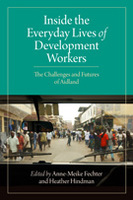Inside the Everyday Lives of Development Workers: The Challenges and Futures of Aidland
Anne-Meike Fechter and Heather Hindman, editors | | ISBN: 978-1-56549-324-7 $67.00 |
| ISBN: 978-1-56549-323-0 $26.50 |
| ISBN: 978-1-56549-389-6 $26.50 |
| 2011/224 pages/LC: 2010043186 |
DESCRIPTION
Rarely is the lens of aid policy turned on the lives of aid workers themselves. Yet, the seemingly impersonal network of agencies and donors that formulate and implement policy are composed of real people with complex motivations and experiences that might provide important lessons about development’s failures and successes. Inside the Everyday Lives of Development Workers breaks new ground by illuminating the social and cultural world of "aidland."
The authors examine how aid workers' moral beliefs link and conflict with their initial motivations; how workers relate to aid beneficiaries, their local NGO counterparts, and other aid workers; their views on race and sexuality; the effect of transient lifestyles; and the security and family issues that come with their careers. The result is an enhanced picture of development processes that acknowledges the rich web of relationships at all levels of the system.
ABOUT THE AUTHOR
Anne-Meike Fechter is senior lecturer in anthropology at the University of Sussex Centre for Migration Research. Heather Hindman is assistant professor of Asian Studies at the University of Texas, Austin.
CONTENTS
- Introduction—the Editors.
- False Binaries: Altruism and Selfishness in NGO Work—S. De Jong.
- Maintaining Independence: The Moral Ambiguities of Personal Relations Among Ghanaian Development Workers—T. Yarrow.
- Intercultural Encounters, Colonial Continuities, and Contemporary Disconnects in Rural Aid: An Ethnography of Development Practitioners in Madagascar—R. Verma.
- Orienting Guesthood in the Mennonite Central Committee, Indonesia—P. Fountain.
- Everywhere and Everthrough: Rethinking Aidland—K. Brown.
- Anybody at Home? The Inhabitants of Aidland—A-M. Fechter.
- Dealing with Danger: Risk and Security in the Everyday Lives of Aid Workers—S. Roth.
- The Hollowing Out of Aidland: Subcontracting and the New Development Family in Nepal—H. Hindman.
- Epilogue: Who Is International Aid? Some Personal Observations—R. Apthorpe.


"Rich with insight into the daily lives and entanglements, the dilemmas and reflections, of the people who work on the front lines of development.... By opening the black box on development work, the authors offer glimpses of soul-searching and pragmatism in equal measure, as workers struggle to find meaning in their work, or simply to get their work done."—Tania Murray Li, University of Toronto
"The international aid industry is now a significant sector employing a vast array of specialized professionals, administrators, field workers and volunteers.... Drawing on up-to-date ethnographic work by leading academic researchers, this timely book provides a fascinating set of insights into their public and private lives."—David Lewis, London School of Economics & Political Science
"This is a superb book, and should be read by a wide range of people, not least those thinking of working in the field."—Adam Fforde, University of Melbourne